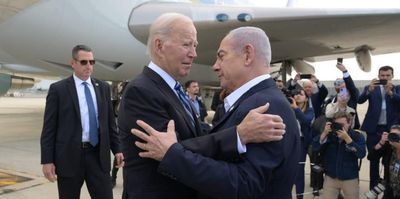Half of Joe Biden’s trip to the Middle East fell apart before he even boarded Air Force One. The US president was meant to spend part of Wednesday with Israeli PM Benjamin Netanyahu, before traveling onwards to Amman for a summit with the leaders of Jordan, Egypt, and the Palestinian Authority.
So much for plans. Things changed dramatically when a blast destroyed the Al-Ahli Hospital in Gaza City Tuesday night, killing hundreds of people. Hamas blames Israel, and Israel blames an errant rocket launched from within Gaza. Neither side showed fully convincing evidence, but with anger against Israel already surging on Arab streets, Jordan’s King Abdullah scrapped the Amman summit altogether.
Biden could have pulled the plug on the trip then. The risks, after all, are tremendous. Personal security is one thing – Israel’s Ben Gurion airport is within range of Hamas rockets, as German Chancellor Olaf Scholz learned the hard way on Tuesday.
But more than that, without the Amman leg of the trip, Biden’s visit will play in the Arab world as a further endorsement of Israel amid soaring popular rage against the Jewish State.
Still, Biden landed in Tel Aviv on Wednesday, where he told Netanyahu that the hospital blast "appears as though it was done by the other team."
With Israel about to launch what’s likely to be a long and bloody ground invasion to clear Hamas from the Gaza Strip, Biden likely sees two key reasons for going anyway:
First, to try to prevent the war from spreading. Biden will stress that any strikes on Israel from Iran or its proxies in Hezbollah would invite a response from US carrier groups that are now stationed off the Israeli coast. Hezbollah is a vastly larger, better-armed, and better-trained fighting force than Hamas. Recent days have already seen some limited clashes between Israel and Hezbollah along Israel’s northern border.
Second, to pose “tough questions” directly to Netanyahu about Israel’s tactics and longer-term objectives, according to White House spokesman John Kirby. Note that over the weekend, in a subtle shift of tone, Biden urged Israel to take steps to ease the deepening humanitarian crisis in besieged Gaza, and to make sure that a “path to a Palestinian state” remains viable. That was before the hospital blast – it remains to be seen whether Biden’s attempt at tough love will play convincingly in Arab capitals that are visibly chilly toward Washington right now.
Meanwhile, West Bank tremors are growing: In response to the hospital blast, protests erupted on the streets of the West Bank. Tensions between Israel and West Bank Palestinians were already rising even before Hamas’ rampage, raising fears that the Israel-Hamas war could trigger a possible third “Intifada” or “mass uprising” in the occupied territories.
While Israel is more insulated from the West Bank now than it was during the last intifada of 2000-2005, any significant upheaval in the occupied territories could further tax Israel’s security forces just as the country opens a southern front against Gaza while watching for a potential northern one against Hezbollah.
- Can the EU get aid to Gaza? - GZERO Media ›
- Is Biden's embrace of Israel a political liability for him? - GZERO Media ›
- Israel-Hamas war: America's tightrope walk - GZERO Media ›
- Israel-Hamas War: Can the US count on its Arab allies? - GZERO Media ›
- As Israel presses conflict, US frustration grows - GZERO Media ›
- Israel, Hamas and US in impasse over cease-fire deal - GZERO Media ›
